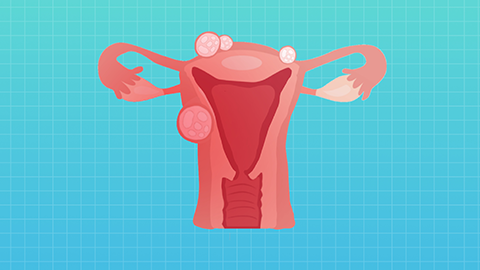What are the symptoms of uterine fibroids?
Uterine fibroids are common benign gynecological tumors formed by abnormal proliferation of uterine smooth muscle cells. Generally, the main symptoms of uterine fibroids include menstrual abnormalities, abdominal masses, increased vaginal discharge, pressure symptoms, pain, and others. A detailed analysis is as follows:

1. Menstrual abnormalities: Uterine fibroids may cause increased menstrual flow,表现为 a significant increase in total menstrual blood loss compared to before, with prolonged menstrual periods lasting more than 10 days. Some patients may also experience shortened menstrual cycles or irregular vaginal bleeding outside the menstrual period. Long-term excessive menstrual bleeding may lead to anemia, causing symptoms such as dizziness and fatigue.
2. Abdominal mass: When the fibroid grows to a certain size, a mass can be felt in the abdomen, particularly noticeable in the morning when the bladder is full. The mass is hard, smooth-surfaced, mobile, and generally non-tender. As the fibroid enlarges further, the abdomen may appear significantly distended, resembling a pregnancy of several months' duration.
3. Increased vaginal discharge: Fibroids may increase the surface area of the uterine cavity and stimulate increased secretion from the endometrial glands, resulting in increased vaginal discharge. This manifests as a noticeable increase in the volume of discharge, which is typically thin and watery. If infection or necrosis of the fibroid occurs, the discharge may become purulent or blood-tinged, accompanied by a foul odor.
4. Pressure symptoms: Larger fibroids may compress surrounding organs, causing corresponding symptoms. For example, compression of the bladder may lead to frequent urination, urgent urination, difficulty urinating, or even urinary retention; compression of the rectum can cause constipation and difficulty defecating; and compression of the ureters may result in hydronephrosis and symptoms such as lower back pain.
5. Pain: Uterine fibroids generally do not cause pain. However, acute abdominal pain may occur when complications such as torsion of a pedunculated fibroid, red degeneration of the fibroid, or coexistence with endometriosis arise. The pain can be severe and is often accompanied by symptoms such as nausea and vomiting. Some patients may experience a sensation of heaviness in the lower abdomen, back pain, or other discomfort, which tends to worsen during menstruation or after physical exertion.
If uterine fibroids are diagnosed, it is important to maintain a regular lifestyle, avoid long-term use of health products containing estrogen, and undergo regular gynecological examinations to monitor changes in the fibroids. Additionally, paying attention to physical symptoms can help detect problems early and allow for timely intervention.




